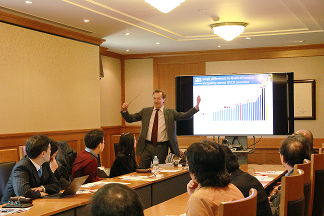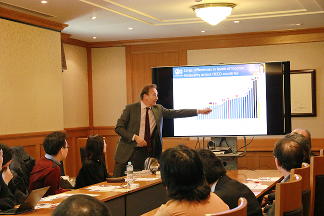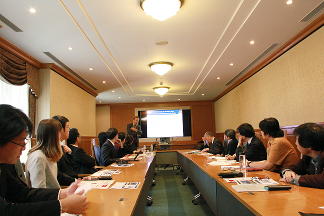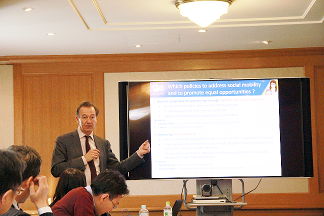The economic and social consequences of inequality
開催日程
2018年 3月 2日(金) 13:00~14:30
場所
慶應義塾大学三田キャンパス 東館5階 会議室
詳細
“The economic and social consequences of inequality”.
To discuss the OECD work on the impact of inequality trends on economic growth, how much impacts on the middle class, and strains on the middle class. This lecture could also talk about social mobility ( inequality of opportunities) as the pathway between inequality of outcomes and inequality of opportunities goes in both directions.
Michael Förster (OECD, Directorate for Employment, Labour and Social Affairs):
Dr Michael Förster is a senior policy analyst at the OECD and as head of the unit ""Income Distribution, Inequality and Poverty" has been involved in successive OECD work on income distribution and poverty. He is co-author of “Growing Unequal?” (2008) and lead author of the follow-up studies, “Divided we Stand: Why Inequality keeps rising” (2011) and "In It Together – Why Less Inequality Benefits All" (2015). Mr. Förster is currently directing several follow-up projects to this work, in particular on inter- and intergenerational income mobility and trends among middle-income classes. He is author of various journal articles, research papers and book contributions, most recently to the Elsevier Handbook of Income Distribution.
To discuss the OECD work on the impact of inequality trends on economic growth, how much impacts on the middle class, and strains on the middle class. This lecture could also talk about social mobility ( inequality of opportunities) as the pathway between inequality of outcomes and inequality of opportunities goes in both directions.
Michael Förster (OECD, Directorate for Employment, Labour and Social Affairs):
Dr Michael Förster is a senior policy analyst at the OECD and as head of the unit ""Income Distribution, Inequality and Poverty" has been involved in successive OECD work on income distribution and poverty. He is co-author of “Growing Unequal?” (2008) and lead author of the follow-up studies, “Divided we Stand: Why Inequality keeps rising” (2011) and "In It Together – Why Less Inequality Benefits All" (2015). Mr. Förster is currently directing several follow-up projects to this work, in particular on inter- and intergenerational income mobility and trends among middle-income classes. He is author of various journal articles, research papers and book contributions, most recently to the Elsevier Handbook of Income Distribution.
備考
■主催
慶應義塾大学パネルデータ設計・解析センター/こどもの機会均等研究センター
■研究資金
科学研究費助成事業(特別推進研究, 17H06086)「長寿社会における世代間移転と経済格差:パネルデータによる政策評価分析」及び「特色ある共同研究拠点の整備の推進事業(パネル調査共同研究拠点)機能強化支援」(研究代表者・樋口美雄)
科学研究費助成事業(基盤研究(S), 16H06323)「経済格差と教育格差の長期的因果関係の解明:親子の追跡データによる分析と国際比較」(研究代表者・赤林英夫)
■ポスター
※使用言語:英語
※事前登録は必要ありません。
慶應義塾大学パネルデータ設計・解析センター/こどもの機会均等研究センター
■研究資金
科学研究費助成事業(特別推進研究, 17H06086)「長寿社会における世代間移転と経済格差:パネルデータによる政策評価分析」及び「特色ある共同研究拠点の整備の推進事業(パネル調査共同研究拠点)機能強化支援」(研究代表者・樋口美雄)
科学研究費助成事業(基盤研究(S), 16H06323)「経済格差と教育格差の長期的因果関係の解明:親子の追跡データによる分析と国際比較」(研究代表者・赤林英夫)
■ポスター
※使用言語:英語
※事前登録は必要ありません。
結果報告
■資料(PDF)はこちらからダウンロードできます。
OECDのEmployment, Labour and Social Affairのディレクトレイトであるマイケル・フォスター氏(OECD上級政策分析官)は、これまでにOECD加盟国における所得の格差に関する研究を行ってきました。
今回、OECDの過去の報告書やこれから出版される報告書に基づき、日本とOECD加盟国における貧困と格差に関する2回の特別講義をお願いしました。
セミナーのメインテーマは、“The causes and consequences of increasing inequalities 拡大する格差の原因と結果”でした。
3月2日に行われた第二回セミナーでは、“What are the economic and social consequences of inequality? ”として、所得格差が経済成長に与える影響について、格差の世代間連鎖に着目して説明が行われました。
具体的には、OECD加盟国における国際比較分析から、所得格差が高い国では長期的に見て経済成長が低くなっていること、その理由として、格差の拡大は、次世代にも連鎖し、特に、低所得層における著しい負の連鎖が、人的資本投資の低下を引き起こし、経済成長に負の影響を与え得ることが説明されました。また、再分配政策は経済成長に負の影響を与えないことから、税・社会保障制度を通じた機会の均等の促進の必要性が強調されました。
学内外から総勢19名の参加者がありました。




OECDのEmployment, Labour and Social Affairのディレクトレイトであるマイケル・フォスター氏(OECD上級政策分析官)は、これまでにOECD加盟国における所得の格差に関する研究を行ってきました。
今回、OECDの過去の報告書やこれから出版される報告書に基づき、日本とOECD加盟国における貧困と格差に関する2回の特別講義をお願いしました。
セミナーのメインテーマは、“The causes and consequences of increasing inequalities 拡大する格差の原因と結果”でした。
3月2日に行われた第二回セミナーでは、“What are the economic and social consequences of inequality? ”として、所得格差が経済成長に与える影響について、格差の世代間連鎖に着目して説明が行われました。
具体的には、OECD加盟国における国際比較分析から、所得格差が高い国では長期的に見て経済成長が低くなっていること、その理由として、格差の拡大は、次世代にも連鎖し、特に、低所得層における著しい負の連鎖が、人的資本投資の低下を引き起こし、経済成長に負の影響を与え得ることが説明されました。また、再分配政策は経済成長に負の影響を与えないことから、税・社会保障制度を通じた機会の均等の促進の必要性が強調されました。
学内外から総勢19名の参加者がありました。







